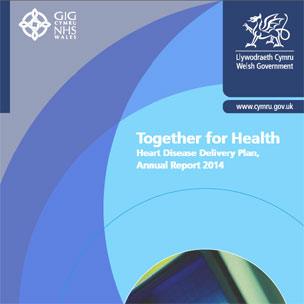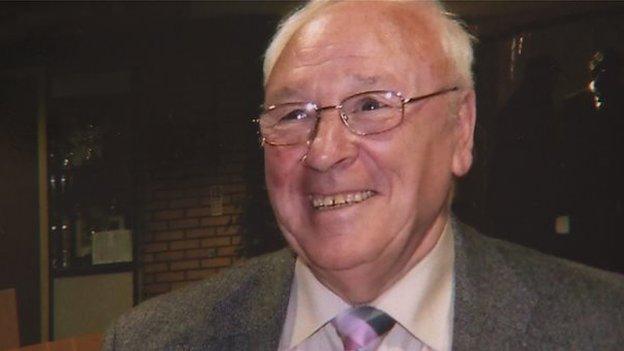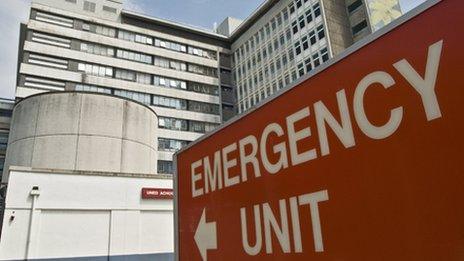Cross-border heart ops to continue to cut Welsh backlog
- Published
Mark Drakeford said you could not simply turn on the tap when it came to complicated surgery
Some heart patients in Wales will continue to be sent to England for surgery in a bid to cut waiting lists.
Cardiac patients are supposed to be seen within six months, but the Welsh NHS has not met that target for more than two years.
A report commissioned by the health minister said the service was still struggling but health boards had a "stronger focus" on easing delays.
Some patients will continue to be treated in England into 2015.
The report was ordered by Health Minister Mark Drakeford to tackle heart disease, a major killer in Wales.
Concerns about waiting times for heart patients emerged a year ago.
There was a rise in deaths of patients waiting for cardiac treatment at hospitals in Cardiff and Swansea while the Royal College of Surgeons warned of its concerns and that the situation was "dangerous".
Ninety-nine patients had died over five years waiting for surgery at either the University Hospital of Wales, Cardiff, or Morriston Hospital, Swansea.
To combat the problem, around 80 patients from Wales were sent for treatment in England in an agreement announced in February.

Heart disease is responsible for more than 4,300 deaths a year in Wales
The report found the number of coronary heart disease cases in Wales are falling, but more than 4,300 people a year are still dying from it.
It said the NHS and health boards were working to help the most urgent patients and to cut waiting times "significantly".
It added, despite some improvements, there are big differences between health boards in how long patients have to wait for a diagnostic electrocardiogram (ECG).
In the Cardiff and Vale area, 100% of patients had access to one within eight weeks, but more than half of Aneurin Bevan health board patients waited longer.


Together for Health report
HEART HIGHLIGHTS:
In Wales in 2012-13, 125,567 people had coronary heart disease, down 8,040 since 2006-07
Heart disease was responsible for more than 4,300 deaths - 14% - of all deaths
Death rates in the most deprived areas are almost a third higher than in the least deprived areas
Up to 97% of adults aged between 35 and 74 survive following a hospital admission for a heart attack
Source: Together for Health - Heart Disease Delivery Plan, Annual Report 2014

Better detection and tackling unhealthy lifestyles had helped, said the report which flagged up a programme run by west Wales health board Hywel Dda, external.
The scheme has helped more than 1,000 people in the workplace at risk of heart disease in Carmarthenshire, Ceredigion and Pembrokeshire.
Dr John Morgan, representing community health councils in Wales, says cross-border care will always be needed
It found 77% had weight issues, 33% had high blood pressure, a quarter were given lifestyle and diet support and 18% were referred to GPs.
Mr Drakeford said there had been "significant progress" but more could be done.
"We will continue to invest in services, improve early diagnosis and prevent the causes of the disease, including cutting smoking levels and encouraging people to adopt healthier lifestyles," he added.
Meanwhile, Mr Drakeford has announced that extra forms of treatment for heart attack patients will be available in north Wales patients from early 2015.
Primary Percutaneous Coronary Intervention (PPCI) - more commonly known as angioplasty - is a non-surgical procedure used to treat narrowed (stenotic) coronary arteries.
Currently, patients have to travel to Chester or Liverpool for angioplasty and cardiac angiography.
He made the announcement on a tour of the new North Wales Cardiac Centre at Glan Clwyd hospital which will open to the public on 4 August.
- Published3 June 2014

- Published26 July 2013

- Published7 May 2014
